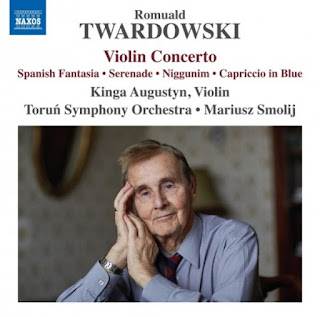What I do not know about Romuald Twardowski (b. 1930) could fill many volumes. Until the release at hand, in fact, I knew nothing at all of him. Yet with this music in my head after several listens I must say I am very glad to know of him now. We have at hand a worthy program of works he composed between 1979 and 2006, concerted works for violin and orchestra, all save one, which is for string orchestra alone. Central to the presentation is the 2006 Violin Concerto (Naxos 8.579031). The whole of it is beautifully given to us with violinist Kinga Augustyn holding forth as needed with a sturdy yet impassioned robustness that always seems just right for the tenor of this music. Mariusz Smolij conducts the Torun Symphony Orchestra with a sure hand and a complete conception of how the music should sound. The orchestra responds nicely.
The music is not all that Modern with a capital /m/, yet it is not stuck in any kind of automatic replay of the past either. He puts forth a music of genuine integrity and original conviction. It is perhaps more Neo-Classic than Neo-Romantic. There is a definite lyrical side that we hear throughout, yet nothing is sentimental so much as singing and ringing forth. The "Violin Concerto" is the linchpin work as far as providing a soaringly singular voice for the solo violin that Augustyn responds to with angelic charm. All the concerted pieces serve to extend Twardowski's vision of the violin's role today in such things. Score and performance nicely conjoin in happy confluence.
Each work has a pronounced flavor, definite character, from the rhapsodous plainspokenness and then impish sprightliness of the "Violin Concerto" to the pronouncedly Jewish melodiousness of the "Niggunim 'Melodies of the Hasidim,'" the Gershwinian tang and tinge of "Capriccio in Blue," the lively and convivial Spanish tinge of the "Spanish Fantasia," it is all good. Then the string-orchestra-only "Serenade" gives us a more direct hearing of his pronounced ease over the falling of the melodic contours on the natural string-ly idiom, his capriciousness as it were. And there is a kind of gritty torque Smolij gets from the strings on "Serenade" that we then listen for all the more readily in the other works. And we then hear it all the more readily.
If you are a lover of strings you will appreciate what is done with them by Twardowski and the performers here. This is the student of Nadia Boulanger, another one who came away with a deft sense of possibilities, whose Lithuanian heritage comes through in his music without necessarily calling attention to itself. The music has Modernity without necessarily following the typical models of how that might come into play and harmonic-melodic strains are not so edgy as they are folk-like in some fundamental sense. There is a natural brilliance to his idea of what sorts of things the block of orchestral strings and the solo violin can do.
It all works wonderfully well and after a good number of listens I hear the full musical personality of this heretofore unknown composer and it seems like a very good thing. If you have the mental-aural space to add more music to your living experience this volume is a very pleasant surprise and well worth your time. And a big bravo to violinist Kinga Augustyn!
Modern classical and avant garde concert music of the 20th and 21st centuries forms the primary focus of this blog. It is hoped that through the discussions a picture will emerge of modern music, its heritage, and what it means for us.
Search This Blog
Friday, February 1, 2019
Romuald Twardowski, Violin Concerto and Other works, Kinga Augustyn, Torun Symphony Orchestra, Mariusz Smolij
Subscribe to:
Post Comments (Atom)

No comments:
Post a Comment